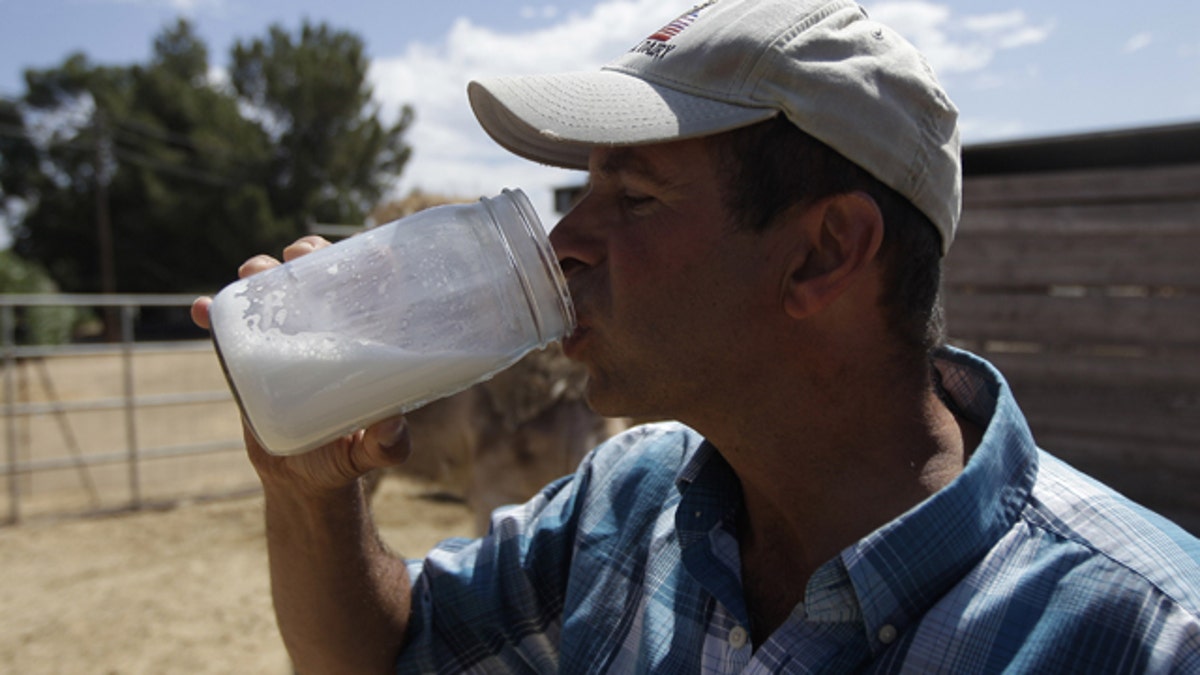
(AP)
LOS ANGELES - To milk a camel, you need warm hands, a gentle touch and quick timing — camels give milk only in 90-second bursts.
Gil and Nancy Riegler, owners of the nation's largest camel dairy near San Diego, said the extra work pays off with milk that is therapeutic, nutritious and delicious.
It's also illegal to sell in the United States.
That hasn't stopped the Rieglers' enthusiasm for their unusual dairy, selling other products such as camel milk soap, giving tours and taking their 22-camel herd on the road to educate others.
In a few years, they hope, the U.S. Food and Drug Administration might establish a test on camel milk that would allow them to make money in other ways.
"If we could sell camel's milk right now, we would have to charge $40 to $60 a liter," said Nancy Riegler, who lives with her husband on their 34-acre dairy in Ramona, northeast of San Diego.
That's because there are only a few thousand camels in the United States — mostly at zoos and wild animal parks — and few of them are breeding, which makes camel milk a rare commodity.
It costs about $12,000 to buy an adult female camel, and $5,000 for a baby.
Still, the Rieglers are sold on what they say are the benefits of camel milk over cow milk. They said it has more vitamin C, more anti-bacterial, anti-viral and anti-inflammatory properties and contains an insulin-like protein that works well in the digestive tract.
Most camel milk is traded informally around the world, but in the future it could be worth roughly $10 billion, said Anthony Bennett, dairy officer for the Food and Agriculture Organization of the United Nations.
"In Russia, Kazakhstan and India, doctors often prescribe it to convalescing patients while, in Africa, it may be recommended for people living with AIDS," Bennett said. "Research is also ongoing into the role claimed for camel milk in reducing diabetes and coronary heart disease."
The FDA allows people to drink camel milk, but it can't be imported or sold in the U.S. until a test for drug residues is validated, said FDA spokesman Michael Herndon.
That could take a while, Herndon said, noting water buffalo milk was allowed in 2003 but it took another six years before all the tests were validated and accepted.
Can't wait? A Dubai company offers a camel milk chocolate bar, but it sells at a San Francisco shop for $12 for just 2.5 ounces.
Despite the price, shop owner Jack Epstein said the camel bar is a steady seller. He favors it over bars made with milk from goat and sheep.
"The camel milk doesn't have any kind of earthy taste," said Epstein, owner of Jack Epstein's Covered Chocolate. "In fact, it seems a little caramelly."
Experts caution, though, against expecting a boom in U.S. camel milk sales, in part because they produce so little milk.
A cow produces six or seven gallons of milk a day while the Rieglers are lucky to get a gallon a day from one of their camels.
"Camels are the most adaptive hoofstock on the planet, but they are not designed for bulk production," said Rod Owlett, an animal care manager at the San Diego Zoo. "Cows have been specifically bred for giving vast amounts of milk."
Until the FDA approves camel milk sales, the Rieglers are finding other ways to make a living — he cuts gems and she shows birds. Together they do monthly open houses, offer camel rides, fair exhibits, private parties, turkey stampedes and school visits.
Jomay Stillman of San Diego had seen the Rieglers' show at a fair and liked it so much she took her family to the dairy on Mother's Day this year.
"They are happy camels. They reminded me of a bunch of Labrador dogs with their dispositions and how they follow them around," she said.
Joan Bradley, her three sons, their wives and 10 grandchildren also have visited the camel dairy.
"We learned that if a camel's lip is not sticking out, it is getting agitated. The further its bottom lip is sticking out, the happier it is," said Bradley, who lives in Poway, Calif.
Besides the camels, the Rieglers have four donkeys, seven sheep, a miniature cow, four horses, 24 turkeys, 17 exotic birds, five cats, four dogs and one pig.
They bought their first dairy camels — a bull and two females from a private owner in Indiana — in 2001, then spent a month training on a camel dairy in Israel. "We got up every day and helped them milk their camels," Nancy Riegler said.
"It was like nothing in America. But we were stepping in and doing what those camels already knew," she said. "Our camels didn't know what we wanted them to do. We went slow and the training worked out great for us and the camels."
They just finished a two-week "Camel Milk Challenge" at the San Diego County Fair, eating nothing but dried dates and drinking only camel's milk and bottled water.
They are planning a monthlong California desert trip next year. They will use the milk-and-date diet and take along a lactating camel, two riding camels and a pack camel to show off the milk and the advantages of camels as companion animals, she said.
They also sell homemade soap — 25 percent of which is camel milk — that usually sells out quickly after being posted online.
"The suds behave differently," Nancy Riegler said, "and it is great for the skin."
